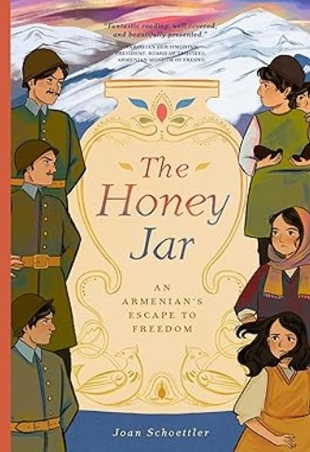With sensitive honesty, The Honey Jar helps children ages eight to twelve understand the devastation of the Armenian genocide and how love can survive even when everything familiar crumbles. Dedicated "to refugees everywhere," this middle-grade novel begins with astonishing lines that underscore the terrible effects of war on children:
"I gave my sister away.
She was two.
I was not yet nine."
When Turkish soldiers close in on their town, the young narrator, Bedros, has to flee with this three younger sisters, his grandmother, and his uncle's family. What makes the task most unbearable is leaving his father and mother behind because she is too ill to move. She places their treasured honey jar in his hands, whispering, "For my children, until we are together again."
Toiling to push a cart filled with his sisters, a little food, and scant belongings, Bedros observes the best and worst of human nature on their three-day walk to the port of Alexandropol, from which they hope to emigrate to America. A Turkish woman by the roadside offers them bread and water; a Turkish shop owner along the way gives them shelter. Yet Turkish soldiers shoot at the fleeing villagers caught in a canyon with few places to hide.
Most confusing and distressing of all, a woman from a market bread stand offers them food and then offers to watch Bedros' two-year-old sister while he searches for his uncle, from whom he and his sisters have been separated. When Bedros returns to the agreed-upon spot, the woman and his sister have both disappeared, his sister clutching the honey pot for comfort.
Told in verse, the story lays out Bedros' panic, remorse, and guilt at losing his sister:
"No one knows about a woman
and a little girl with a honey jar.
My heart pounds.
My middle churns at
what I have done.
Snow begins to fall.
In my panic, I feel helpless.
I yearn for my mother's embrace."
In closing sections, author Joan Schoettler tells the true story which inspired the book and gives a two-page history of the Armenian genocide. She writes words which poignantly ring increasingly true each day: "Throughout history, groups of people have been forced to flee their homeland because of ethnic and religious conflicts and war. People have traveled to find a safe haven where they can live peacefully. Even today, in some parts of the world, parents continue to send their children away to protect them from political unrest, war, famine, and genocide. Some never see each other again."
Amid all the loss in this story, it has a remarkable and fortunate ending — with a reappearance of the honey pot — that occurs decades later. The greatest blessing of all is that surviving family members overcome their guilt and blame, so that in the end love prevails.
